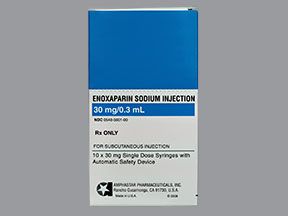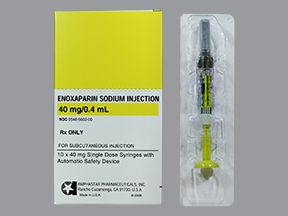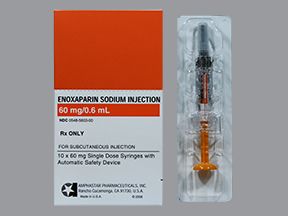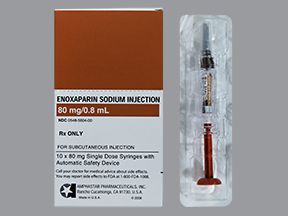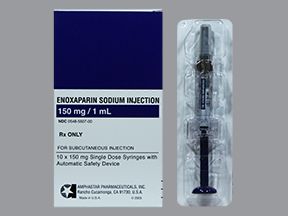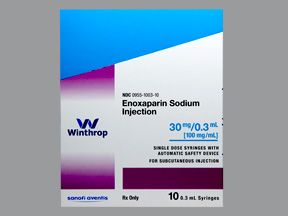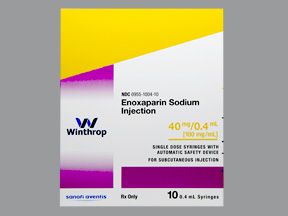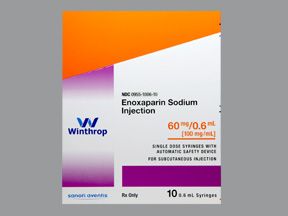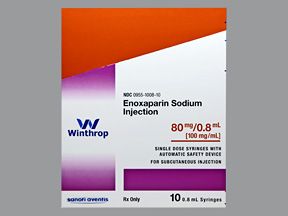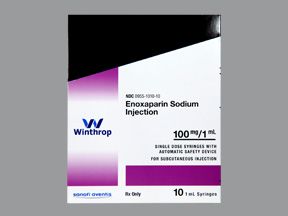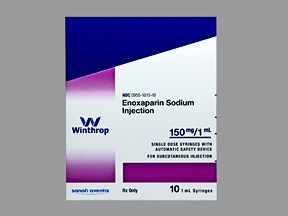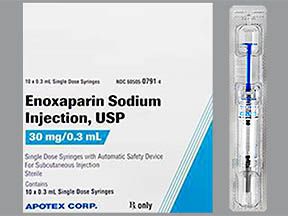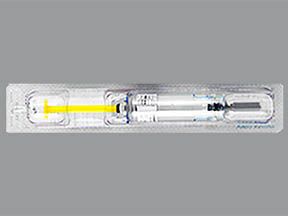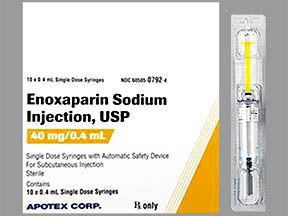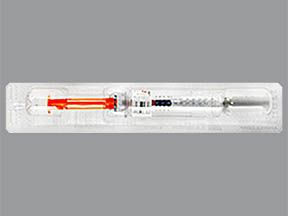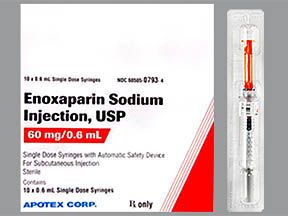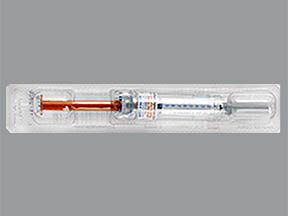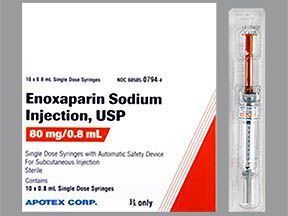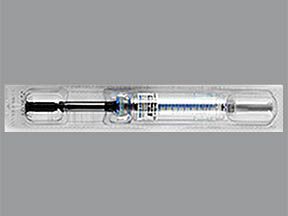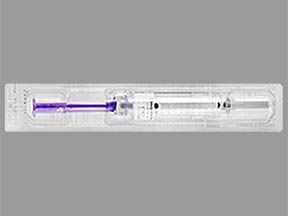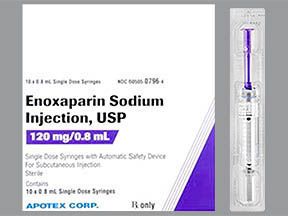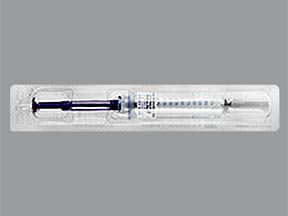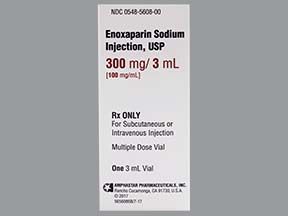Highlights for enoxaparin
- Enoxaparin injectable solution is available as both a generic and brand-name drug. Brand name: Lovenox.
- Enoxaparin is injected subcutaneously (under your skin). Your healthcare provider will show you how to give this drug to yourself.
- Enoxaparin is used to prevent blood clots in people who are hospitalized or at home. It’s also used to treat existing blood clots both at home or in the hospital.
FDA warning: Bleeding in the spinal column
- This drug has a black box warning. This is the most serious warning from the Food and Drug Administration (FDA). A black box warning alerts doctors and patients about drug effects that may be dangerous.
- If you receive anesthesia through your spinal column or have a procedure that involves puncturing your spinal column, this drug may increase your risk of bleeding in this area. This can lead to a long-term or permanent paralysis (inability to move your legs). Your doctor should watch you closely for signs of this type of bleeding.
- Bleeding: This drug raises your risk of bleeding. This may cause nosebleeds, increased bruising, increased bleeding from cuts, bleeding from your gums after brushing or flossing your teeth, blood in your urine, or red- or black-colored stools. Tell your doctor if you have any of these symptoms.
- Low platelets: In rare cases, this drug may lower your platelets. Platelets are needed for your blood to clot. This increases your risk of bleeding even more. Your doctor will monitor your platelet level.
Enoxaparin injectable solution is a prescription drug that’s available as the brand-name drug Lovenox. It’s also available as a generic drug. Generic drugs usually cost less. In some cases, they may not be available in every strength or form as the brand-name version.
It’s available as a solution for injection in a prefilled syringe. It’s also available as a solution for injection in a vial, which is only given by a healthcare provider. Enoxaparin is a self-injectable drug.
Why it’s used
Enoxaparin is used to thin your blood. It keeps your blood from forming clots. Blood clots are dangerous because they can lead to serious blockages in your blood vessels. This can cause a stroke or a heart attack.
This drug is used to prevent blood clots in people who are hospitalized. It may be used if you’re too sick to move around or if you’re having a heart attack.
It’s also used to prevent blood clots at home after you’ve had stomach surgery or a hip or knee replacement. This drug is also used to treat existing blood clots in the hospital or at home. A blood clot can be treated at home as long as it isn’t in your lungs.
This drug works fast, so it may be the first blood thinner your doctor gives you. You may need to take this drug until you can take oral blood thinners instead. Oral blood thinners take more time to work.
Enoxaparin may be used as part of a combination therapy. This means you may need to take it with other medications. Follow your doctor’s instructions closely because you may need to start or stop this drug or another blood thinner at specific times.
How it works
Enoxaparin belongs to a class of drugs called anticoagulants. A class of drugs is a group of medications that work in a similar way. These drugs are often used to treat similar conditions.
Enoxaparin works by blocking a protein in your body that causes clotting. This keeps blood clots from forming. If you have a blood clot, it will stop it from getting worse while your body breaks down the clot on its own.
Enoxaparin injectable solution may cause pain or bruising of the skin at the site of the injection. This may be more likely when you first start taking the drug, or when your doctor increases your dose. This drug may also cause other side effects.
More common side effects
The more common side effects of enoxaparin can include:
- bleeding
- anemia (not having enough healthy red blood cells)
- pain and bruising at the site on your skin where you give the injection
- fever
- swelling in your legs
If these effects are mild, they may go away within a few days or a couple of weeks. If they’re more severe or don’t go away, talk to your doctor or pharmacist.
Serious side effects
Call your doctor right away if you have serious side effects. Call 911 if your symptoms feel life-threatening or if you think you’re having a medical emergency. Serious side effects and their symptoms can include the following:
- Rebound stroke. This is a stroke that can happen once you stop taking this drug. Symptoms can include:
- trouble speaking or understanding
- loss of control or numbness in your face, arms, or legs
- trouble seeing out of one or both of your eyes
- headache
- trouble walking
- Bleeding. Symptoms can include:
- abdominal pain
- black or tarry stool
- nosebleeds
- bleeding gums
- coughing up blood
- bruising more easily than normal
- bloody vomit
- Rebound blood clots. These blood clots can happen once you stop taking this drug. Symptoms can include:
- chest pain
- trouble breathing
- warmth, redness, or swelling in your arms or legs
Disclaimer: Our goal is to provide you with the most relevant and current information. However, because drugs affect each person differently, we cannot guarantee that this information includes all possible side effects. This information is not a substitute for medical advice. Always discuss possible side effects with a healthcare provider who knows your medical history.
Enoxaparin injectable solution can interact with other medications, vitamins, or herbs you may be taking. An interaction is when a substance changes the way a drug works. This can be harmful or prevent the drug from working well.
To help avoid interactions, your doctor should manage all of your medications carefully. Be sure to tell your doctor about all medications, vitamins, or herbs you’re taking. To find out how this drug might interact with something else you’re taking, talk to your doctor or pharmacist.
Taking enoxaparin with certain medications raises your risk of side effects. This is because enoxaparin and these other medications can cause the same side effects. As a result, these side effects can be increased. Examples of these drugs include:
- Nonsteroidal anti-inflammatory drugs (NSAIDs), such as aspirin, ibuprofen, or naproxen. These drugs can decrease your platelets. If you take them with enoxaparin, this puts you at higher risk for bleeding.
- Platelet inhibitors, such as clopidogrel, prasugrel, ticagrelor, or dipyridamole. These drugs can decrease your platelets. If you take them with enoxaparin, this puts you at higher risk for bleeding.
- Herbal supplements, such as ginkgo biloba, fish oil, garlic, ginseng, and ginger. These supplements can decrease your platelets. If you take them with enoxaparin, this puts you at higher risk for bleeding.
Disclaimer: Our goal is to provide you with the most relevant and current information. However, because drugs interact differently in each person, we cannot guarantee that this information includes all possible interactions. This information is not a substitute for medical advice. Always speak with your healthcare provider about possible interactions with all prescription drugs, vitamins, herbs and supplements, and over-the-counter drugs that you are taking.
Enoxaparin injectable solution comes with several warnings.
Allergy warning
Enoxaparin can cause a severe allergic reaction. Symptoms can include:
- trouble breathing
- swelling of your throat or tongue
- hives
- rash
If you have an allergic reaction, call your doctor or local poison control center right away. If your symptoms are severe, call 911 or go to the nearest emergency room.
Don’t take this drug again if you’ve ever had an allergic reaction to it. Taking it again could be fatal (cause death).
Don’t take this drug if you’ve ever had an allergic reaction to heparin, pork products, or benzyl alcohol.
Warnings for people with certain health conditions
For people with kidney problems: If you have kidney problems or a history of kidney disease, you may not be able to clear this drug from your body well. This may cause the drug to build up in your body and cause more side effects. Your doctor may decrease your dosage if you have severe kidney disease.
For people with a low body weight: Women who weigh less than 99 lb (45 kg) and men who weigh less than 126 lb (57 kg) may have higher levels of enoxaparin in their bodies. Your doctor may monitor you more closely for signs of bleeding. They may also give you a lower dosage to avoid side effects.
For people with a high body weight: This drug hasn’t been studied well in people who are obese (a body mass index or BMI of 30 or higher). If you’re obese, your doctor may monitor you more closely for signs of a clot. They may also do tests to see if your dose needs to be changed.
For people with diabetes-related eye problems: This drug can cause bleeding. If you have retinopathy from diabetes that means the blood vessels in your eyes already leak blood. Taking this drug puts you at high risk for hemorrhage (severe, life-threatening bleeding).
For people with high blood pressure: This drug can cause bleeding. If you have high blood pressure that isn’t controlled, you’re at high risk for hemorrhage (severe, life-threatening bleeding).
For people with a history of a stomach ulcer: If you’ve recently had a stomach ulcer, ask your doctor whether this drug is safe for you.
For people with platelet disorders: You shouldn’t use this drug if you’ve had heparin-induced thrombocytopenia (a problem with your platelets that’s related to receiving heparin or similar drugs). If you have low platelets, ask your doctor whether this drug is safe for you.
For people with certain heart valves: If you have a mechanical prosthetic heart valve, ask your doctor whether this drug is safe for you. This drug hasn’t been studied well in people with these types of heart valves.
For people with bleeding disorders: If you have a bleeding disorder, ask your doctor whether this drug is safe for you. You’re already at high risk for bleeding and this drug will further increase your risk.
Warnings for other groups
For pregnant women: Enoxaparin is a category B pregnancy drug. That means two things:
- Research in animals hasn’t shown a risk to the fetus when the mother takes the drug.
- There aren’t enough studies done in humans to show if the drug poses a risk to the fetus.
Talk to your doctor if you’re pregnant or planning to become pregnant. Animal studies don’t always predict the way humans would respond. Therefore, this drug should only be used in pregnancy if clearly needed. Call your doctor right away if you become pregnant while taking this drug.
For women who are breastfeeding: Enoxaparin may pass into breast milk and may cause side effects in a child who is breastfed. Talk to your doctor if you breastfeed your child. You may need to decide whether to stop breastfeeding or stop taking this medication.
For seniors: The kidneys of older adults may not work as well as they used to. This can cause your body to process drugs more slowly. As a result, more of a drug stays in your body for a longer time. This raises your risk of side effects. If you’re older than 65 years, you may be at higher risk of bleeding while taking this drug.
For children: This drug hasn’t been studied in children. It shouldn’t be used in people younger than 18 years.
This dosage information is for enoxaparin injectable solution. All possible dosages and drug forms may not be included here. Your dosage, drug form, and how often you take the drug will depend on:
- your age
- the condition being treated
- how severe your condition is
- other medical conditions you have
- how you react to the first dose
Forms and strengths
Generic: enoxaparin
- Form: Injectable prefilled syringes
- Strengths: 30 mg, 40 mg, 60 mg, 80 mg, 100 mg, 120 mg, and 150 mg
Brand: Lovenox
- Form: Injectable prefilled syringes
- Strengths: 30 mg, 40 mg, 60 mg, 80 mg, 100 mg, 120 mg, and 150 mg
Dosage for the prevention of deep vein thrombosis
Adult dosage (ages 18–64 years)
- People who’ve had abdominal surgery: 40 mg injected once per day
- People who’ve had knee replacement surgery: 30 mg injected every 12 hours
- People who’ve had hip replacement surgery: 30 mg injected every 12 hours or 40 mg injected once per day
- People who are in the hospital and can’t move much: 40 mg injected once per day
Child dosage (ages 0–17 years)
It hasn’t been confirmed that this drug is safe and effective for use in people younger than 18 years.
Senior dosage (ages 65 years and older)
The kidneys of older adults may not work as well as they used to. This can cause your body to process drugs more slowly. As a result, more of a drug stays in your body for a longer time. This raises your risk of side effects. Your doctor may start you on a lowered dose or a different dosing schedule. This can help keep levels of this drug from building up too much in your body.
Special considerations
People with severe kidney problems:
- People who’ve had abdominal surgery: 30 mg injected once per day
- People who’ve had hip or knee replacement surgery: 30 mg injected once per day
- People who are in the hospital and can’t move much: 30 mg injected once per day
Dosage for the treatment of deep vein thrombosis with or without lung clots
Adult dosage (ages 18–64 years)
- Treatment at home for people without lung clots: 1 mg per kg of body weight injected every 12 hours
- Treatment in the hospital for people with or without lung clots: 1 mg per kg of body weight injected every 12 hours or 1.5 mg per kg of body weight injected once per day. This will be given by a healthcare provider in the hospital.
Child dosage (ages 0–17 years)
It hasn’t been confirmed that this drug is safe and effective for use in people younger than 18 years.
Senior dosage (ages 65 years and older)
The kidneys of older adults may not work as well as they used to. This can cause your body to process drugs more slowly. As a result, more of a drug stays in your body for a longer time. This raises your risk of side effects. Your doctor may start you on a lowered dose or a different dosing schedule. This can help keep levels of this drug from building up too much in your body.
Special considerations
People with severe kidney problems:
- Treatment at home for people without lung clots: 1 mg per kg of body weight injected once per day
- Treatment in the hospital for people with or without lung clots: 1 mg per kg of body weight injected once per day. This will be given by a healthcare provider in the hospital.
Dosage for the prevention of cardiac problems during heart attacks
Adult dosage (ages 18–64 years)
1 mg per kg of body weight injected every 12 hours while you’re in the hospital
Child dosage (ages 0–17 years)
It hasn’t been confirmed that this drug is safe and effective for use in people younger than 18 years.
Senior dosage (ages 65 years and older)
The kidneys of older adults may not work as well as they used to. This can cause your body to process drugs more slowly. As a result, more of a drug stays in your body for a longer time. This raises your risk of side effects. Your doctor may start you on a lowered dose or a different dosing schedule. This can help keep levels of this drug from building up too much in your body.
Special considerations
Severe kidney problems: 1 mg per kg of body weight injected once per day. This will be given by a healthcare provider in the hospital.
Dosage for the treatment of heart attacks
Adult dosage (ages 18–64 years)
Typical dosage is a one-time intravenous (into the vein) injection of 30 mg given in the hospital, plus a 1-mg/kg injection under the skin. Then, 1 mg per kg of body weight will be injected every 12 hours. This will be given by a healthcare provider in the hospital.
Child dosage (ages 0–17 years)
It hasn’t been confirmed that this drug is safe and effective for use in people younger than 18 years.
Senior dosage (ages 65–74 years)
Typical dosage is a one-time intravenous (into the vein) injection of 30 mg plus a 1-mg/kg injection under the skin. Then, 1 mg per kg of body weight will be injected every 12 hours, given in the hospital.
Senior dosage (ages 75 years and older)
0.75 mg per kg of body weight injected every 12 hours. This will be given by a healthcare provider in the hospital.
Special considerations
- Severe kidney problems (ages 18–74 years): Typical dosage is a one-time intravenous (into the vein) injection of 30 mg, plus a 1-mg/kg injection under the skin. Then, 1 mg per kg of body weight will be injected once per day, given in the hospital.
- Severe kidney problems (ages 75 years and older): Typical dosage is 1 mg per kg of body weight injected once per day. This will be given by a healthcare provider in the hospital.
Disclaimer: Our goal is to provide you with the most relevant and current information. However, because drugs affect each person differently, we cannot guarantee that this list includes all possible dosages. This information is not a substitute for medical advice. Always to speak with your doctor or pharmacist about dosages that are right for you.
Enoxaparin injectable solution is used for short-term treatment. It comes with risks if you don’t take it as prescribed.
If you stop taking the drug suddenly or don’t take it at all: You’ll have a higher risk for a blood clot. This could lead to serious problems, such as a stroke or death. Take this drug on the schedule set by your doctor. Don’t stop taking it without speaking with your doctor first.
If you miss doses or don’t take the drug on schedule: Your medication may not work as well or may stop working completely. For this drug to work well, a certain amount needs to be in your body at all times.
If you take too much: You could have dangerous levels of the drug in your body. This could lead to bleeding. Symptoms of an overdose of this drug can include:
- abdominal pain
- black or tarry stool
- nosebleeds
- bleeding gums
- coughing up blood
- bruising more easily than normal
- bloody vomit
If you think you’ve taken too much of this drug, call your doctor or local poison control center. If your symptoms are severe, call 911 or go to the nearest emergency room right away.
What to do if you miss a dose: Take your dose as soon as you remember. But if you remember just a few hours before your next scheduled dose, take only one dose. Never try to catch up by taking two doses at once. This could result in dangerous side effects.
How to tell if the drug is working: You won’t be able to feel if this drug is working. Your doctor will do blood tests to check if this drug is working for you.
Keep these considerations in mind if your doctor prescribes enoxaparin injectable solution for you.
General
Not every pharmacy stocks this drug. When filling your prescription, be sure to call ahead.
Storage
Store enoxaparin at room temperature. Keep it at 77°F (25°C). Keep it away from light. Don’t store this medication in moist or damp areas, such as bathrooms.
Refills
A prescription for this medication is refillable. You shouldn’t need a new prescription for this medication to be refilled. Your doctor will write the number of refills authorized on your prescription.
Travel
When traveling with your medication:
- Always carry your medication with you. When flying, never put it into a checked bag. Keep it in your carry-on bag.
- Don’t worry about airport x-ray machines. They can’t hurt your medication.
- You may need to show airport staff the pharmacy label for your medication. Always carry the original prescription-labeled box with you.
- Don’t put this medication in your car’s glove compartment or leave it in the car. Be sure to avoid doing this when the weather is very hot or very cold.
Self-management
Your healthcare provider will show you how to give yourself an injection of this drug.
Clinical monitoring
You and your doctor should monitor certain health issues. This can help make sure you stay safe while you take this drug. These issues include:
- Kidney function. Your doctor may do blood tests to check how well your kidneys are working. If your kidneys aren’t working well, your doctor may lower your dose of this drug.
- Platelet count. Your doctor will monitor your level of platelets. This is done to make sure you’re not at a high risk of bleeding or that you’re not having side effects.
- Anti-Xa levels. These levels can help let your doctor know how well this drug is working for you. This is especially important if you’re obese or you have kidney problems.
Hidden costs
You may need to purchase the following to give yourself an injection of this drug:
- sterile alcohol wipes
- a sharps container (a bin used to safely throw away used lancets)
Insurance
Many insurance companies require a prior authorization for this drug. This means your doctor will need to get approval from your insurance company before your insurance company will pay for the prescription.
There are other drugs available to treat your condition. Some may be better suited for you than others. Talk to your doctor about other drug options that may work for you.
Disclaimer: Healthline has made every effort to make certain that all information is factually correct, comprehensive, and up-to-date. However, this article should not be used as a substitute for the knowledge and expertise of a licensed healthcare professional. You should always consult your doctor or other healthcare professional before taking any medication. The drug information contained herein is subject to change and is not intended to cover all possible uses, directions, precautions, warnings, drug interactions, allergic reactions, or adverse effects. The absence of warnings or other information for a given drug does not indicate that the drug or drug combination is safe, effective, or appropriate for all patients or all specific uses.





